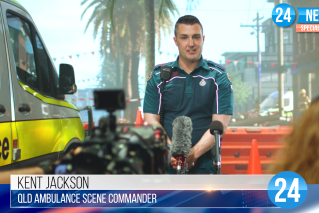
What to do when the law is a tool of injustice?
Kathleen Folbigg’s unconditional pardon, after serving 20 years for the murder of her three infant children and the manslaughter of a fourth child, has been a shocking reminder for many Australians that our law can be an instrument of injustice.

Rear view of themis statue with balance scales in black and white
But Kathleen’s is not the only one of its kind in Australian legal history, nor will it be the last. While we await the Hon. Tom Bathurst KC’s final report, to be released in coming weeks, many are asking how this happened, why it took so long to achieve this outcome and how can we be sure cases like Kathleen’s don’t happen again?
Criminal Cases Review Commissions
We have seen numerous calls for the establishment of an independent Criminal Cases Review Commission (CCRC) in Australia. Many, including Kathleen’s lawyer Rhanee Rego, claim that a CCRC could be a legacy of Kathleen’s fight for justice.
Proponents, pointing to other jurisdictions that have introduced CCRCs, suggest that a CCRC may ease the burden on the system, be more cost effective, and promote public confidence in the criminal justice process.
But this is not necessarily the reality. In fact, the UK CCRC, despite some 25 years since its foundation, has faced considerable criticism, including underfunding, under-resourcing, and a workload that has doubled since 2010. Similar criticisms have been made of CCRCs elsewhere.
While a CCRC is, for many, the dream, there are other remedies and reforms that can, and should, be introduced to make a more expeditious impact on criminal justice in Australia.
The experience of the Griffith University Innocence Project
Established in 2002, the Griffith University Innocence Project is well-placed to contribute to discussion as to how to remedy miscarriages of justice in this country. We have been working in this space for more than two decades.
Over 400 law students have dedicated thousands of hours to our applicants’ cases and have advocated for law reform around the country. Though, we do admit that we haven’t had the wins we hoped for twenty years ago. Let’s consider some of the barriers the Griffith Innocence Project and others like ours experience daily.
Preservation of evidence – In the USA, every state has laws ensuring the preservation of evidence. While Australian jurisdictions generally preserve biological evidence for a lengthy period, most exhibits are not preserved. Instead, they are invariably returned to parties or destroyed soon after the conclusion of the appeal period. How can post-conviction innocence testing be undertaken when the evidence we want to re-test doesn’t exist anymore?
Access to information – We can’t help people if we can’t get information about their case. Often, information we do obtain is so heavily redacted it is rendered useless to our applicants and us.
Guilty plea cases – The majority of criminal cases resolve by way of a guilty plea, with few proceeding to trial. But we know that people can, and do, plead guilty to crimes they did not commit. For us, however, this means no trial transcript to analyse, no evidence to retest and not a lot we can do in the absence of fresh evidence of innocence.
Straightforward avenues back into court via reform of appeals processes. Considerations here could include revisiting the limitations of ‘fresh evidence’ that often means any evidence available but not raised at trial cannot be raised at a subsequent appeal. Non-disclosure is widely recognised as one of the most common causes of wrongful conviction. New evidence, not presented at trial, is often available but doesn’t satisfy the definition of ‘fresh’.
Without pathways back into court, we rely on the good graces of Attorneys-General to have our applications for access to evidence, information or even pardons considered. This process is unnecessarily political and very uncertain.
Absolute certainty of guilt is not feasible, nor is it required in criminal cases. Beyond reasonable doubt means there is always small risk of error. But this is the role of the appeal courts. Where there are gaps, legislative reform can step in. While a CCRC body is highly desirable, a more immediate focus should be on improving existing criminal prosecution processes through legislative reform.
What do we mean by miscarriage of justice?
The adversarial process has always allowed for assumption and inference. Who argues best? Who pays the most? Who copes best under cross-examination? Whether defendant is fighting a wrongful conviction, a victim of sexual violence, a juvenile in detention, a First Nations person or person of colour, our criminal justice systems seem to be increasingly not fit for purpose. Traditions that may have served many very well in the past could arguably do with a re-think.















